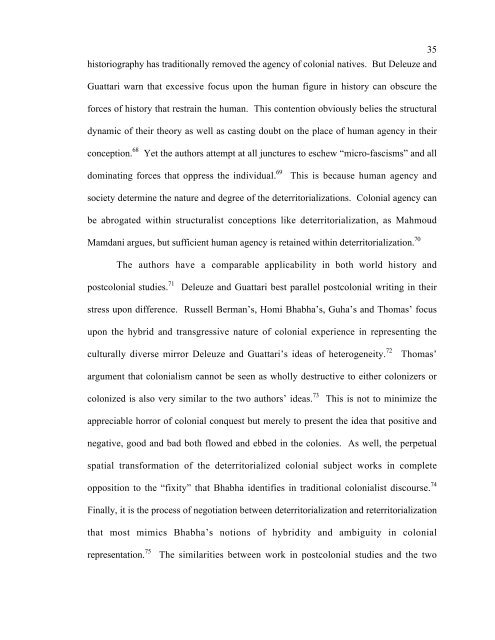A Deterritorialized History: Investigating German Colonialism ...
A Deterritorialized History: Investigating German Colonialism ...
A Deterritorialized History: Investigating German Colonialism ...
You also want an ePaper? Increase the reach of your titles
YUMPU automatically turns print PDFs into web optimized ePapers that Google loves.
historiography has traditionally removed the agency of colonial natives. But Deleuze and<br />
Guattari warn that excessive focus upon the human figure in history can obscure the<br />
forces of history that restrain the human. This contention obviously belies the structural<br />
dynamic of their theory as well as casting doubt on the place of human agency in their<br />
conception. 68 Yet the authors attempt at all junctures to eschew “micro-fascisms” and all<br />
dominating forces that oppress the individual. 69 This is because human agency and<br />
society determine the nature and degree of the deterritorializations. Colonial agency can<br />
be abrogated within structuralist conceptions like deterritorialization, as Mahmoud<br />
Mamdani argues, but sufficient human agency is retained within deterritorialization. 70<br />
The authors have a comparable applicability in both world history and<br />
postcolonial studies. 71 Deleuze and Guattari best parallel postcolonial writing in their<br />
stress upon difference. Russell Berman’s, Homi Bhabha’s, Guha’s and Thomas’ focus<br />
upon the hybrid and transgressive nature of colonial experience in representing the<br />
culturally diverse mirror Deleuze and Guattari’s ideas of heterogeneity. 72 Thomas’<br />
argument that colonialism cannot be seen as wholly destructive to either colonizers or<br />
colonized is also very similar to the two authors’ ideas. 73 This is not to minimize the<br />
appreciable horror of colonial conquest but merely to present the idea that positive and<br />
negative, good and bad both flowed and ebbed in the colonies. As well, the perpetual<br />
spatial transformation of the deterritorialized colonial subject works in complete<br />
opposition to the “fixity” that Bhabha identifies in traditional colonialist discourse. 74<br />
Finally, it is the process of negotiation between deterritorialization and reterritorialization<br />
that most mimics Bhabha’s notions of hybridity and ambiguity in colonial<br />
representation. 75 The similarities between work in postcolonial studies and the two<br />
35
















